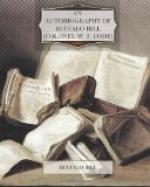There he stayed till his followers began leaving him and returning to their reservations in the United States. Soon he had only a remnant of his followers and his immediate family to keep him company. Warily he began negotiating for immunity, and when he was fully assured that if he would use his influence to quiet his people and keep them from the warpath his life would be spared, he consented to return.
He had been lonely and unhappy in Canada. An accomplished orator and a man with a gift of leadership, he had pined for audiences to sway and for men to do his bidding. He felt sure that these would be restored to him once he came back among his people. As to his pledges, I have no doubt that he fully intended to live up to them. He carried in his head all the treaties that had been made between his people and the white men, and could recite their minutest details, together with the dates of their making and the names of the men who had signed for both sides.
But he was a stickler for the rights of his race, and he devoted far more thought to the trend of events than did most of his red brothers.
Here was his case, as he often presented it to me:
“The White Man has taken most of our land. He has paid us nothing for it. He has destroyed or driven away the game that was our meat. In 1868 he arranged to build through the Indians’ land a road on which ran iron horses that ate wood and breathed fire and smoke. We agreed. This road was only as wide as a man could stretch his arms. But the White Man had taken from the Indians the land for twenty miles on both sides of it. This land he had sold for money to people in the East. It was taken from the Indians. But the Indians got nothing for it.
“The iron horse brought from the East men and women and children, who took the land from the Indians and drove out the game. They built fires, and the fires spread and burned the prairie grass on which the buffalo fed. Also it destroyed the pasturage for the ponies of the Indians. Soon the friends of the first White Men came and took more land. Then cities arose and always the White Man’s lands were extended and the Indians pushed farther and farther away from the country that the Great Father had given them and that had always been theirs.
“When treaties were broken and the Indians trespassed on the rights of the White Man, my chiefs and I were always here to adjust the White Man’s wrongs.
“When treaties were broken and the Indians’ rights were infringed, no one could find the white chiefs. They were somewhere back toward the rising sun. There was no one to give us justice. New chiefs of the White Men came to supplant the old chiefs. They knew nothing of our wrongs and laughed at us.
“When the Sioux left Minnesota and went beyond the Big Muddy the white chiefs promised them they would never again be disturbed. Then they followed us across the river, and when we asked for lands they gave us each a prairie chicken’s flight four ways (a hundred and sixty acres); this they gave us, who once had all the land there was, and whose habit is to roam as far as a horse can carry us and then continue our journey till we have had our fill of wandering.




